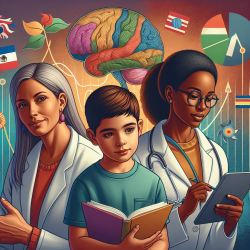Introduction
In the field of speech-language pathology, making informed decisions is crucial for achieving the best outcomes for children. As practitioners, we often rely on a variety of sources to guide our interventions. However, a recent study titled "Epistemic spillovers: Learning others’ political views reduces the ability to assess and use their expertise in nonpolitical domains" sheds light on a cognitive bias that could impact our decision-making processes. This blog post explores the implications of this research and offers strategies for practitioners to enhance their skills by being aware of and mitigating these biases.
Understanding Epistemic Spillovers
The research by Marks et al. (2019) investigates how individuals' knowledge of others' political views can interfere with their ability to accurately assess expertise in unrelated domains. The study found that participants often preferred to seek advice from those who shared their political views, even when evidence suggested that individuals with different political views were more skilled in the task at hand. This phenomenon, known as epistemic spillover, highlights a significant bias in information-seeking behavior.
Implications for Practitioners
For speech-language pathologists, understanding epistemic spillovers is essential. Our field requires us to evaluate and integrate information from various sources, including research articles, expert opinions, and interdisciplinary collaborations. Recognizing the potential for bias based on non-relevant factors such as political views can help us make more objective decisions.
Here are some strategies to mitigate the effects of epistemic spillovers:
- Awareness: Being aware of this cognitive bias is the first step. Reflect on whether personal biases are influencing your choice of sources or collaborators.
- Diverse Perspectives: Actively seek out and consider perspectives from individuals with different backgrounds and viewpoints. This diversity can enrich your understanding and decision-making.
- Evidence-Based Practice: Prioritize evidence-based research and data over personal opinions. Let empirical evidence guide your clinical decisions.
- Continuous Learning: Engage in professional development opportunities that challenge your assumptions and expand your knowledge base.
Encouraging Further Research
While the study by Marks et al. provides valuable insights, it also opens avenues for further research. Practitioners can contribute to the field by exploring how epistemic spillovers affect clinical decision-making in speech-language pathology. Consider conducting studies or participating in collaborative research projects that examine the impact of cognitive biases on professional practice.
Conclusion
In conclusion, understanding and addressing epistemic spillovers is crucial for speech-language pathologists committed to data-driven, evidence-based practice. By recognizing and mitigating these biases, practitioners can make more informed decisions that lead to better outcomes for the children they serve.
To read the original research paper, please follow this link: Epistemic spillovers: Learning others’ political views reduces the ability to assess and use their expertise in nonpolitical domains.










